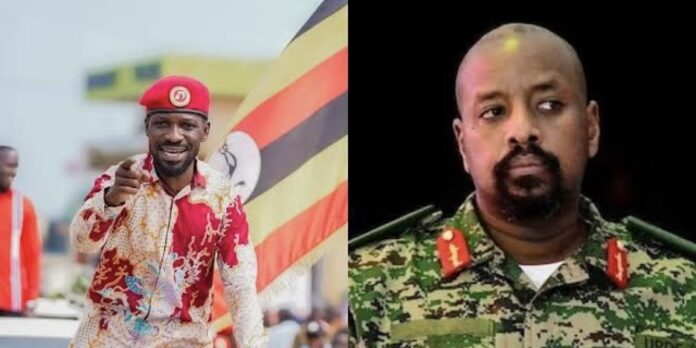A fresh wave of political tension has erupted in Uganda following a shocking social media post by Lieutenant General Muhoozi Kainerugaba, son of long-standing President Yoweri Museveni. Kainerugaba, who also serves as the head of Uganda’s military, openly threatened to behead the opposition leader, Bobi Wine, sparking both outrage and alarm.
In a post shared on Sunday evening, Kainerugaba wrote, “If Mzee was not there, I would cut off his head today,” referring to his father by the Swahili honorific meaning “elder.” The comment, which appeared to target Robert Kyagulanyi, popularly known as Bobi Wine, drew immediate condemnation from Wine and his supporters.
Wine, a prominent musician-turned-politician, has been Museveni’s most formidable political opponent. He lost the 2021 presidential election but rejected the results, alleging voter fraud and state intimidation. Reacting to the threat, Wine took to X (formerly Twitter), stating, “I do not take this lightly,” while pointing out past attempts on his life.
A Legacy of Provocative Comments
This is not the first time Kainerugaba has caused controversy with his remarks. In 2022, he drew global attention with a tweet threatening to invade neighboring Kenya, a comment that required an official apology and assurances from the Ugandan government that it did not reflect state policy.
While Kainerugaba later claimed some of his posts are ironic, critics argue that his words carry weight due to his position and family ties. A Ugandan government spokesperson previously described his posts as “casual” and not to be taken seriously. However, many Ugandans see them as indicative of the growing tension between Museveni’s administration and the opposition.
Responding to Wine’s dismissal of his comment as a threat, Kainerugaba doubled down, stating: “Finally! I woke you up? Before I behead you, repay us the money we loaned you.” The cryptic remark hints at alleged financial transactions between Wine and the government, though no evidence has been provided.
Political Implications
Kainerugaba’s fiery rhetoric underscores his growing influence in Uganda’s political landscape. As Museveni’s son and a senior military officer, he is widely regarded as a potential successor to the presidency. His recent outburst has raised concerns about the future of Uganda’s democracy under a potential Kainerugaba-led administration.
Human rights activists have long accused Museveni’s government of stifling dissent through intimidation, torture, and arbitrary detention. Opposition leaders like Wine have faced arrests, harassment, and threats, creating an atmosphere of fear.
“The use of threats, whether serious or casual, reflects the ongoing culture of impunity in Uganda,” said a representative from Human Rights Watch. “Political opposition is not a crime, but the ruling regime continues to treat it as one.”
Bobi Wine’s Struggle for Democracy
Bobi Wine rose to prominence as a political figure by leveraging his celebrity status and youth appeal. Representing the voice of a generation disillusioned by Museveni’s decades-long rule, Wine’s campaign during the 2021 election energized millions. However, he faced what he described as systemic oppression, including violent crackdowns on his rallies and restrictions on his movements.
Wine’s rejection of the election results was supported by allegations from international observers and human rights organizations, who reported irregularities such as voter suppression and ballot stuffing. Despite this, Museveni’s government has consistently denied these claims, asserting that the election was free and fair.
Kainerugaba’s recent comments have reignited fears about the safety of opposition leaders in Uganda. Wine’s supporters have called on international organizations and allies to intervene, emphasizing the need to safeguard democratic freedoms in the country.
Mixed Reactions
Public reaction to Kainerugaba’s post has been polarizing. While his supporters dismiss the threat as a joke, opposition voices argue that such rhetoric reflects deeper issues within Uganda’s governance.
“Threats like these cannot be ignored,” said an opposition supporter in Kampala. “They show how intolerant the government has become toward dissenting voices. This is not just about Bobi Wine; it’s about the future of our democracy.”
Others view Kainerugaba’s social media antics as a ploy to maintain relevance and assert dominance. His frequent, unfiltered posts have earned him a reputation as a maverick, but they also raise questions about his suitability for leadership.
A Family Legacy of Power
Yoweri Museveni has ruled Uganda since 1986, making him one of Africa’s longest-serving leaders. His tenure has been marked by economic progress in some areas but overshadowed by accusations of authoritarianism. Many observers see Kainerugaba’s rise as a continuation of the Museveni dynasty, potentially cementing the family’s hold on power.
Critics argue that Museveni’s failure to curb his son’s provocative behavior reflects a deeper strategy to test public reaction to a potential Kainerugaba presidency. By allowing him to operate with impunity, Museveni may be paving the way for his succession while keeping opposition forces in check.
What Lies Ahead?
As of now, neither the Ugandan government nor the military has issued an official response to the latest controversy. A spokesperson for the armed forces declined to comment when contacted. The lack of accountability has only fueled speculation about the intentions behind Kainerugaba’s statements.
For Bobi Wine, the threat serves as a grim reminder of the challenges he faces in his pursuit of democratic reform. “This is not about me alone,” Wine said in a recent interview. “It’s about every Ugandan who dreams of a country where freedom of speech and political participation are respected.”
The international community, including Uganda’s key allies, will be closely monitoring the fallout from Kainerugaba’s comments. For now, the threat remains a chilling testament to the fragile state of democracy in Uganda.

